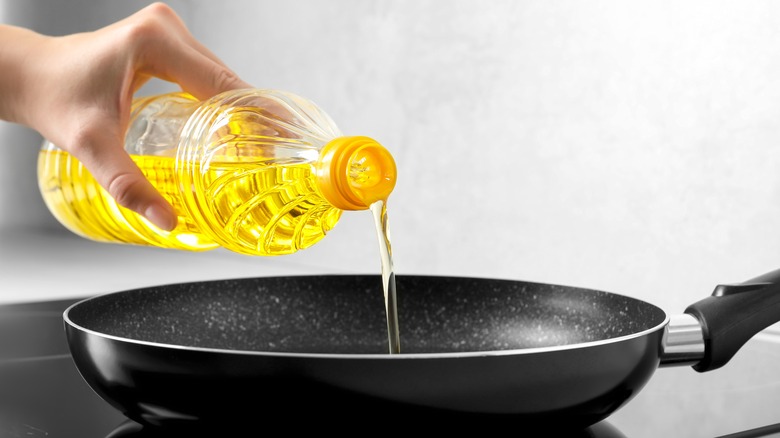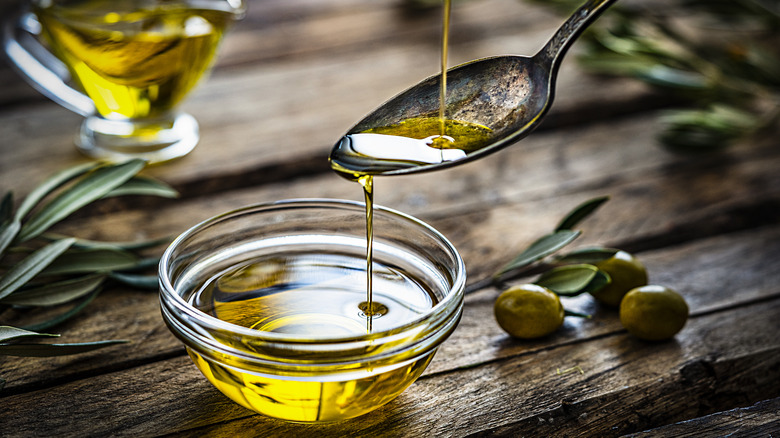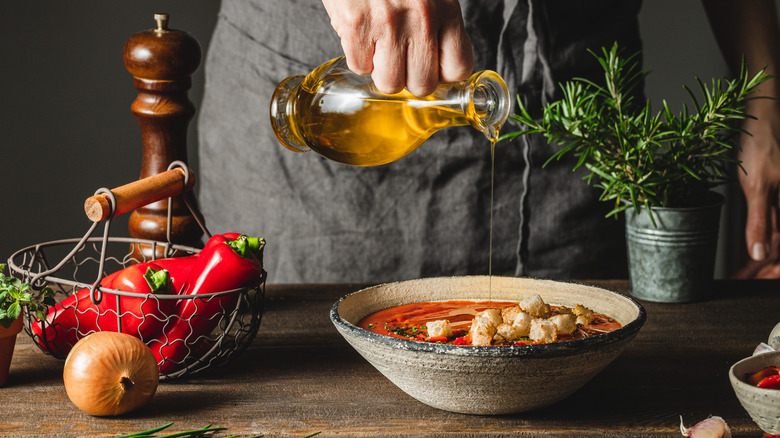When To Cook With Vegetable Vs Olive Oil For The Best Results
Most home cooks will probably have more than one cooking oil in their pantry, and two of the most common ones will be olive and vegetable oil. While there are situations where these two are interchangeable, they're far from identical, and it pays to know the differences.
Let's start with vegetable oil: Know that "vegetable oil" is defined broadly, and it can be made with a range of ingredients from soy to corn, canola, and beyond. While there may be small differences in terms of things like the smoke point and flavor, it's generally a very neutral tasting oil. Vegetable oils may be sold in their refined or unrefined forms — the refined version will usually hold up better at high heat, while unrefined oils may contain stronger flavors.
Vegetable oil's neutral flavor means it can be used in a pretty broad range of settings from frying to grilling: While it won't add much flavor to a recipe, it also won't mess with a recipe by adding incompatible flavors. So, for example, if you're cooking a Chinese dish that calls for sesame oil, vegetable oil isn't a bad substitute, although you'll lose the nuttiness of the sesame oil. Since vegetable oil has a higher smoke point, it's good for cooking with medium to high heat — so, it'll hold up for methods like deep- or shallow-frying or sauteing. And while you can use it for lower-heat cooking, you may want to opt for olive oil, which brings its own advantages.
Where olive oil works best
Olive oil has a lower smoke point: It will start to break down at temperatures as low as 325 degrees Fahrenheit, so it's generally considered unsuitable for any kind of frying, or anything like a grill where temperatures can go well over 400 degrees. (That said, there are refined olive oils with higher smoke points that may hold up in these settings.) It works better in medium-heat settings like roasting (although vegetable oil is fine here, too), or in recipes that won't involve heat at all, like salad dressings or dips.
You can also use olive oil for baking (except perhaps for items baked at higher heats like bread) — but this is the kind of situation where lines get blurry. Vegetable oil also works for baking and is sometimes recommended as a formidable go-to in place of butter. But when used right, olive oil can add a terrific extra dimension to baked goods like cakes, whereas vegetable oil might give a more plain end result. This is part of the difficulty of knowing when to use olive oil: Some of the rules are just about how well the oil holds up under heat, but olive oil also has a distinct flavor you need to know how to work with.
The question of flavor
Deciding when to use olive oil requires you to think about flavor combinations, too. Olive oil generally has a distinctive floral or fruity taste to it that won't fit neatly into every dish, even if you're using an appropriate heat level for olive oil. Olive oil is generally considered to work well with Mediterranean, Middle Eastern, and North African cuisines. This is because these locations are major olive growers, and the oil is already an established part of the culinary culture. Outside of these cuisines, it's harder to say: It's commonly suggested that olive oil doesn't work well with, say, east Asian cuisine, as its flavor might clash, although you can find cooks who still advocate for this.
On the flip side, sometimes you do want that olive oil taste. Salad dressings are a great example of this: While vegetable oil will still work decently in a salad dressing, it's not going to add any extra layers of taste to the mix. Similarly, if you're garnishing a dish, olive oil will work better, since vegetable oil won't add much flavor (although vegetable oil may work if it's infused with other ingredients like herbs). Lastly, be attentive to different types of olive oil: Extra-virgin olive oil (EVOO) will have a more distinctive flavor but not hold up to heat so well, so they're better for salads or garnishing, while regular olive oil may be better for cooking with heat.


